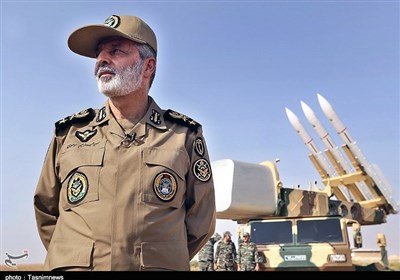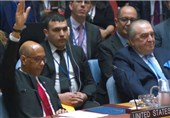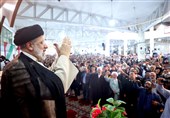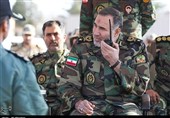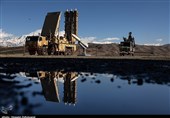Trump Avowed Enemy of EU: Italian Analyst
TEHRAN (Tasnim) – A senior fellow with the Transatlantic Program of the Istituto Affari Internazionali (IAI) said US President Donald Trump is an “avowed enemy” of Europe as he sees the bloc as a “potential rival power” and that is why he prefers a “fragmented Europe”.
“I agree with Marcon's point that modern Europe was built to be America's junior partner, and I agree that the US commitment to Europe has now become more ambivalent and more uncertain,” Alcaro told Tasnim in an interview.
He added, “Trump is an avowed enemy of the European Union, which he sees as a trade competitor and a potential rival power of the US. Future presidents will have to decide whether they want a weaker, loyal Europe (� la Bush), a stronger but more autonomous Europe (� la Obama), or a fragmented Europe (� la Trump)”.
Riccardo Alcaro is Research Coordinator and Head of the Global Actors Programme of the Istituto Affari Internazionali. His main area of expertise is transatlantic relations, with a special focus on US and European policies in Europe’s surrounding regions. Riccardo has been a visiting fellow at the Center on the United States and Europe of the Brookings Institution in Washington and a fellow of the EU-wide program European Foreign and Security Policy Studies (EFSPS). He holds a summa-cum-laude PhD from the University of Tübingen. He is the author of Europe and Iran’s Nuclear Crisis (Palgrave Macmillan 2018) and editor of The Liberal Order and its Contestations (Routledge 2018) and The West and the Global Power Shift (Palgrave Macmillan 2016).
Following is the full text of the interview.
Tasnim: French President Emanuel Macron recently proposed a bleak vision of Europe’s future and its possible disappearance. Later, in an interview with The Economics, he explained, “I’m trying to face the facts. Personally, I think Europe is a miracle. This continent has the greatest geographical concentration of cultural and linguistic diversity. Which explains why, for almost two millennia, Europe was rocked by constant civil wars.” Do you believe so?
Alcaro: The European Union, that is, a system of interstate relations that has willingly transitioned from a fundamentally competitive pattern into a long-term cooperative pattern based on common norms, rules, and institutions, is indeed a historical novelty - a 'miracle' even, in the sense that it has no precedents.
Tasnim: Elsewhere in the interview, Macron referred to a shift in the US policy in the past years, saying, “Moreover, Europe was basically built to be the Americans’ junior partner. That was what lay behind the Marshall Plan from the beginning. And this went hand in hand with a benevolent United States, acting as the ultimate guarantor of a system and of a balance of values, based on the preservation of world peace and the domination of Western values. There was a price to pay for that, which was NATO and support to the European Union. But their position has shifted over the past 10 years, and it hasn’t only been the Trump administration. You have to understand what is happening deep down in American policy-making. It’s the idea put forward by President Obama: ‘I am a Pacific president’.” What are your thoughts on this?
Alcaro: I agree with Marcon's point that modern Europe was built to be America's junior partner, and I agree that the US commitment to Europe has now become more ambivalent and more uncertain. I'm not so convinced that the US will abandon Europe because it gains massively from having the loyalty of a number of wealthy countries such as the European ones, but now the prospect is no longer just an academic hypothesis. Even if the US remains committed to Europe, however, its approach will continue to be fraught with ambivalence, as the US oscillates between a desire for a loyal Europe (which involves greater dependence on the US, so a weaker Europe), and a desire for a Europe more capable of contributing to international security and economic stability, which involves a more autonomous Europe. George W. Bush leaned towards the first option. On the contrary, Obama's self-depiction as a Pacific president presupposed a transatlantic relationship in which Europe would be more capable of autonomous action. In other words, Obama was willing to give more leeway to the Europeans, because he was convinced that a strong Europe, even if more autonomous from the US, would most of the times make a common front with the US or be at any rate to the advantage of the US. Regrettably, Europe was not yet ready to become the kind of partner Obama had in mind. Trump is an avowed enemy of the European Union, which he sees as a trade competitor and a potential rival power of the US. Future presidents will have to decide whether they want a weaker, loyal Europe (� la Bush), a stronger but more autonomous Europe (� la Obama), or a fragmented Europe (� la Trump).
Tasnim: In another part of the interview, Macron discussed ways to build “European sovereignty” and also referred to the “brain death of NATO”. He said, "... things are changing; we need to keep explaining this. There is a deep current of thought that was structured in the period between 1990 and 2000 around the idea of the ‘end of history’, of a limitless expansion of democracy, of the triumph of the West as a universal value system. That was the accepted truth at the time, until the 2000s, when a series of shocks demonstrated that it wasn’t actually so true. So I think the first thing to do is to regain military sovereignty. I pushed European defense issues to the forefront as soon as I took office, at the European level, at the Franco-German level.” Can you please explain what Macron means by “European sovereignty” and the “brain death of NATO”?
Alcaro: NATO is 'brain-dead' according to Macron because it hasn't been the place where the transatlantic partners collectively discuss their common interests, shared objectives and joint strategies (so there's no 'thinking', no brain, capacity in NATO). But Macron's point is that with a US president who considered NATO outdated such as Trump, the Alliance is in a coma but can wake up in the future under another president. Irrespective of this, Macron has a point in warning the Europeans that they need to become more capable of exerting power and playing the geopolitical game if they want to avoid being squeezed between the US and China (and Russia). In order to do that, Europe has to use its trade and market size also as geopolitical instruments (it has to be a regulatory power), coordinate more diplomatically (diplomatic power), and eventually develop military capabilities (military power). It's a process that will take time, particularly on the military front, but is indeed warranted if Europe wants to maintain an ability to carve out an autonomous room for foreign policy action.
Tasnim: In an address to the UN's International Labour Organization back in June, Macron denounced "capitalism gone mad", while urging enhanced social protections in a global economy plagued by inequality. What do you think about this?
Alcaro: I think market forces need better antitrust, environmental and data protection regulations, and more protection of workers' rights. In this regard, I see where Macron's comments come from.


